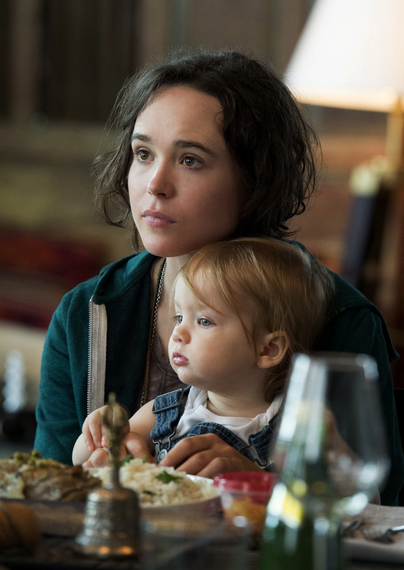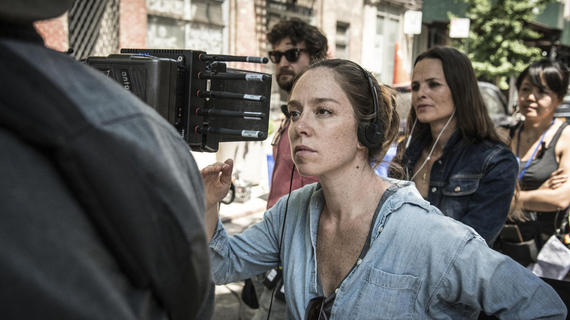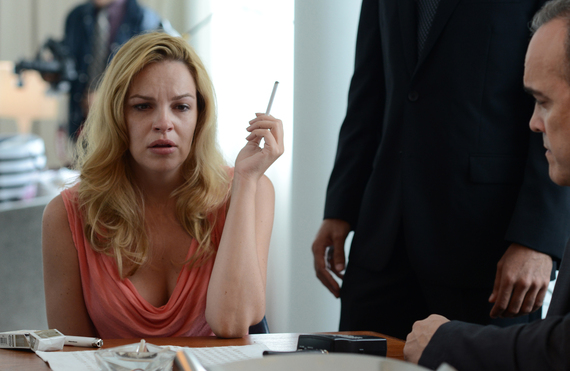Tallulah is a gem - a midsummer gem, an indie gem, a Juno gem-again, a why we love small movies gem. Perfect and glittery and compact in large part because of the pristinely talented women who joined forces to crush this film that premieres Friday July 29 on Netflix and in selected theaters.
Sian Heder, a writer for Orange Is the New Black wrote and directed this movie that brings Juno's Ellen Page and Allison Janney together again along with a breath-taking performance by Tammy Blanchard as the World's Worst Mother.
The story comes from a real-life experience Heder once had while working as a hotel babysitter in Los Angeles and was asked to look after a toddler whose train wreck of a parent had checked in to pursue an affair. Tempted at the time to rescue the child, she turned the experience in a short film called Mother and then expanded it into Tallulah. Ellen Page plays the title role as the homeless young drifter who has come to New York looking for the boyfriend who abandoned her and is mistaken for a hotel worker by the already wasted and spanx-clad Carolyn who throws cash at her to watch her one-year-old Madison while she steps out for the night. Only this time the babysitter takes the baby and runs - right to the missing boyfriend's mom Margo - played to nuanced perfection by Alison Janney. Mercurial and always mad at somebody since her husband left her for a man and her son left her for Tallulah, but so funny and great you just want to stay with her anyway.
So the trio begins - Tallulah, stolen baby Madison and professionally angry Margo - but alas and of course, this misguided but magical center can't hold. The baby has to be found by police and returned to her mother and that's when this film takes off and becomes not just good but excellent. Tammy Blanchard as blowsy, drunk, wounded Carolyn shows us what it looks like to realize you have really done the worst thing in the world and experience true shame. You honestly have to see this to believe it - we both understand and almost forgive.
All of this delivered with a light touch, an easy mix of tension, sadness and humor and some crystalline supporting performances including Uzo Aduba as the pregnant police officer helping lead the search for baby Madison and John Benjamin Hickey as the soon to be ex-husband of Margo. Oh, there is also some weightlessness.
I interviewed Sian Heder this week about her film:
Nancy Doyle Palmer: So much of this film is about abandonment - Tallulah was abandoned by her mother as a child and later by her boyfriend. Baby Madison's mother Carolyn is the epitome of neglect and rejection; Margo's husband has left her for a man. Yet lots of others are there to pick up the pieces - Lu(Tallulah) rescues Madison, Margo rescues Lu, the police eventually rescue Madison. Can you share how you used these themes to maximum effect?
Sian Heder: A lot people have picked up on that and been moved by it in the audience, particularly women who approach me after the film and say it resonated with feelings of abandonment in their own lives. I'm interested in lost characters, in people whose own families have failed or disappointed them and are forced to go out in the world and make their own way, make their own connections. This really is a film about both looking for a mother and becoming a mother and all three characters, Tallulah, Carolyn and Margo are all doing that in their own way.
NDP: Another theme is gravity - without giving anything a way, two characters deal with a loss of it at the start and end of the film - what compelled you to include this visual element?
SH: I think particularly with everything going crazy in the world right now I'm struck by the fact that we are all stuck together here on the planet, for better or worse and we're forced to bump up together as human beings and figure it out short of the decision to exit the planet or die. We're in this life and confronted by our own humanity and each other, so gravity became the theme to me of what it is to be alive and forced to deal.
NDP: The 800 lb. gorilla is Tallulah is motherhood - lots of, uh, challenged parenting here -and I understand you directed this film while pregnant with your second child. You present the spectrum of good and bad maternal instincts here while seeming to withhold judgement, how did you do that?
SH: I became a mother while I was trying to get the film made and if you looked at drafts I wrote before that event it was a less complicated story and my villain was a much clearer villain, but later I found that I related more to Carolyn once I had a child, and I related to Margo more as well. It's hard to pass judgement when you have to deal with your own personal failings or the guilt that you're not doing it right. My own experience with these conflicted feelings gave me a lot more compassion for my characters.
Recently a friend came over with her 2 month old and just asked me if she was ever going to get it back, get herself back, and I told her you will, but it's different. There is this huge sense of grief for your sense of self that no one warns you about - it forever changes and transforms you.
NDP: The other astonishing portrayal in Tallulah is Tammy Blanchard's Carolyn who behaves so despicably and then experiences shame in a way I've never seen done more movingly. Were you surprised by her performance?
SH: From the moment Tammy walked into the room for her audition and started to say Carolyn's words, there was no judgement coming from her towards that character. I think she deeply loved her and had been through some things in her own life, and came to embody Carolyn as sexy and somehow dangerous, intensely vulnerable and childlike and lost. You don't know whether to hug her or run away or push her out of the room. You are having simultaneous conflicting emotions because she's a completely lost soul and not a joke, or a villain.
NDP: While many people hold baby Madison only Tallulah ever looks at her directly and really sees her. Was this intentional?
SH: We actually did have a scene with just Margo and the baby but decided we didn't need it because this was not the primary relationship. You know Margo is going to love that child because he's a connection to her son, but the relationship that is driving the biggest transformation is between Tallulah and the baby as she discovers the nurturer inside her. In a way she kidnaps herself, taking on the responsibility of being loved and needed. It gave her a sense of discovery, an awakening within her of the innocence of the child.
And in real life that connection also happened between baby Evie and Ellen - Ellen had warned us at the start that she wasn't a baby person but by the last shot Ellen was in real hysterical tears when she gave the baby up - I think she took a journey as well in terms of bonding, after holding this little baby for 22 days straight.
NDP: Has your work on OITNB helped inform this films similar message that there are often good reasons for even the worst kind of behavior - the backstory as redemption?
SH: I'm very interested in redemption stories because they are so human, we are all flawed and we all make mistakes and we hope there will be forgiveness for us for the mistakes, particularly when it comes to women, both on OITNB and Tallulah. This idea of exploring characters whom you judge at first glance - then as you delve into their stories you discover their humanity, it becomes relatable. I tend to explore subversive characters that we tend to judge, particularly when it comes to women.



